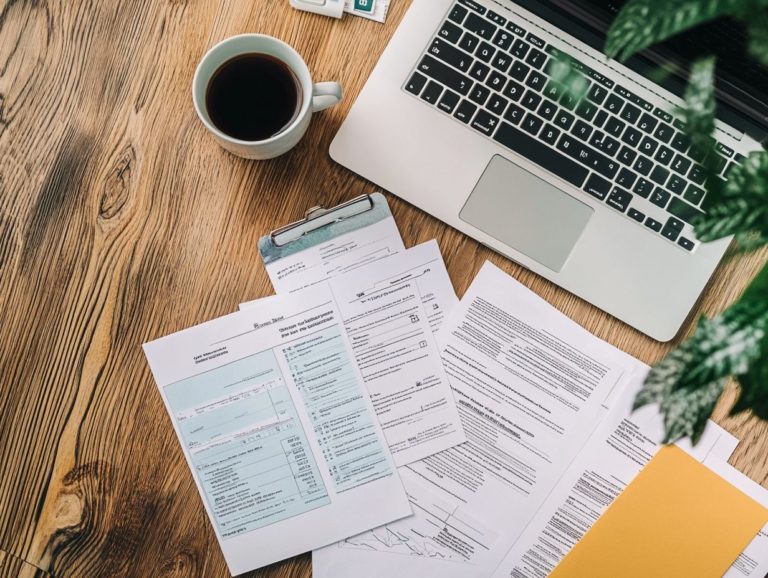5 Essential Tax Tips for Creative Freelancers
Navigating taxes can feel overwhelming for creative freelancers with multiple projects. Understanding your financial obligations is crucial for compliance and maximizing earnings.
This article shares five essential tax tips for freelancers. You’ll learn about estimated taxes, deductions, and how to track expenses effectively.
Contents
- Key Takeaways:
- 1. Keep Track of Your Expenses
- 2. Understand Your Tax Deductions
- 3. Set Aside Money for Taxes
- 4. Consider Hiring a Tax Professional
- 5. Stay Up-to-Date with Tax Laws and Deadlines
- What Is Considered Taxable Income for Freelancers?
- Frequently Asked Questions
- 1. What are the 5 essential tax tips for creative freelancers?
- 2. Why is it important for creative freelancers to keep detailed records?
- 3. How can tracking expenses benefit creative freelancers during tax season?
- 4. What should freelancers know about deductions and credits?
- 5. Why is it essential for creative freelancers to set aside money for taxes?
- 6. When should creative freelancers consider consulting with a tax professional?
Key Takeaways:

- Keep detailed records of your expenses to maximize deductions.
- Understand tax deductions specific to freelancers, such as home office costs.
- Set aside income for taxes to avoid a large bill at year s end.
1. Keep Track of Your Expenses
As a freelancer, keeping a meticulous record of your expenses is essential. This helps manage your finances and reduce the amount you owe in taxes.
Document expenses with receipts and invoices to deduct them on tax forms. This can lead to potential refunds and financial security.
Using digital tools like accounting software can simplify this process. Many freelancers find apps that categorize expenses automatically very helpful.
Ensure you track deductible costs, such as home office expenses and business insurance. Regularly updating your records makes tax time much easier.
2. Understand Your Tax Deductions
For freelancers, knowing about tax deductions is crucial for saving money. Deductions can cover expenses like health insurance and home office costs.
Keep accurate records of all relevant expenses. This includes a detailed log of your home office setup and any materials purchased for your business.
Tax forms like Schedule C help report income and deductions. Knowing how your expenses relate to your freelance work ensures you maximize deductions while following tax rules.
3. Set Aside Money for Taxes
Setting aside money for taxes is crucial for freelancers. As a freelancer, you must make estimated tax payments throughout the year to avoid hefty tax bills.
Creating a dedicated savings account can be a game-changer. It helps you manage cash flow and reduces financial stress during tax season.
Understanding how to calculate estimated taxes is vital. A good rule of thumb is to set aside about 25-30% of your income for taxes.
Be mindful of quarterly tax deadlines. These can sneak up on you if not tracked carefully.
Use a calendar or reminder app to stay organized. Consider setting aside a percentage of each payment into your tax account to cover unexpected expenses.
4. Consider Hiring a Tax Professional

Hiring a tax professional offers invaluable support as you navigate your tax obligations. They ensure compliance with the Internal Revenue Service (IRS) and maximize your deductions.
A skilled freelance accountant lightens your load with tax calculations and provides tailored advice. They can assist you in completing essential tax forms, like the 1099-NEC, which is crucial for reporting your income accurately.
Working with someone who understands tax laws keeps you informed about important deadlines. This not only helps avoid penalties but also enhances your financial security.
This proactive approach allows you to focus more on your craft, knowing your tax matters are expertly managed.
5. Stay Up-to-Date with Tax Laws and Deadlines
Staying current with evolving tax laws and deadlines is essential for freelancers. This ensures compliance and helps you avoid penalties or late fees.
Being proactive about tax changes can protect your financial health and simplify tax preparations each year. Accessing reliable resources is crucial.
Regularly check the IRS website for the latest updates on tax regulations. It’s a treasure trove of information waiting for you.
Organizations like the Freelancers Union offer tailored insights for self-employed individuals. Subscribing to financial newsletters keeps you informed about significant changes that might affect your earnings.
Mark important tax deadlines on your calendar. This ensures timely submissions and helps maintain peace of mind amidst a busy freelance schedule. To further ease the process, consider maximizing deductions as a freelancer.
What Is Considered Taxable Income for Freelancers?
For freelancers, grasping what qualifies as taxable income is vital for precise reporting and compliance with the IRS. Freelance income typically includes earnings from contract work, reported using tax forms like the 1099-NEC, and it covers all earnings before any deductions for expenses or taxes.
Your income may also include contract fees and various revenue streams such as royalties, commissions, or even earnings from side projects. Each of these income sources has its own reporting requirements. It’s imperative to meticulously track all your earnings to ensure compliance with IRS guidelines.
Properly reporting freelance income helps you determine your tax liabilities and safeguards you against potential penalties for underreporting. Understanding these implications enables you to make informed decisions regarding deductible expenses. Additionally, be sure to explore 5 tax credits freelancers shouldn’t miss to further reduce your taxable income and lessen your overall tax burden.
What Are the Common Tax Deductions for Freelancers?
Common tax deductions for freelancers can significantly lower your taxable income. These include a range of business expenses like the home office deduction, health insurance premiums, and costs associated with business equipment and supplies.
Understanding these deductions is vital for maximizing your savings and minimizing tax liabilities. For instance, if you use a portion of your home exclusively for your business, you can claim a percentage of your housing expenses. Proper documentation, such as utility bills or mortgage statements, is necessary to qualify.
You can also deduct health insurance premiums if you’re self-employed. Keep records of your insurance payments to maximize your tax benefits. Costs related to business equipment from computers to office supplies are deductible as well. It’s crucial to keep your purchase receipts and document how these items are used in your business activities to stay in line with IRS requirements.
How Can a Freelancer Reduce Their Taxable Income?

Freelancers can take various proactive steps to reduce taxable income. By maximizing tax deductions for business expenses and contributing to retirement plans like a SEP IRA or Keogh plan, you can effectively lower both your taxable income and self-employment tax (the taxes that freelancers pay based on their earnings).
It’s essential to maintain meticulous records of all your expenses. This practice aids in accurately reporting the costs associated with your work and ensures you don t miss out on any deductions. Effective financial planning and budgeting will help you anticipate potential tax liabilities, enhancing your overall financial wellness.
Utilizing tax software like TurboTax can simplify the process of identifying eligible deductions and tax credits. This makes it easier for freelancers to file taxes and stay organized. By taking these proactive measures and leveraging available tools, you can optimize your tax situation and avoid the top tax mistakes freelancers make, keeping more of your hard-earned money right where it belongs in your pocket.
What Are the Tax Deadlines for Freelancers?
Don t miss your tax deadlines! They re crucial for every freelancer to ensure that you file your returns and payments on time. Estimated taxes are typically due four times a year, as mandated by the IRS. Missing these deadlines can lead to costly penalties and interest charges. Staying organized and informed is essential.
Mark your calendar for quarterly estimated tax payments, which are usually scheduled for:
- April 15
- June 15
- September 15
- January 15 of the following year
Don t forget the annual filing deadline, typically falling on April 15. To sidestep the last-minute scramble that can result in errors and oversights, gather your financial documents throughout the year, set reminders, and consider consulting a tax professional for tailored advice.
Maintaining a savings account for tax savings can significantly lighten your load by ensuring you have the necessary funds available when payments are due. Start organizing your finances today to avoid last-minute stress!
How Can a Freelancer Keep Track of Their Income and Expenses?
For freelancers, maintaining precise records of business income and freelancer expenses is paramount for achieving financial security and ensuring compliance with tax obligations. By leveraging accounting software, you can streamline this process and efficiently track your freelance income while categorizing your expenses. This makes tax preparation a breeze.
Today, many methods can simplify this task. Expense tracking is one of the best options. Mobile apps have gained popularity as convenient tools, allowing you to log transactions effortlessly while on the go, thanks to their user-friendly interfaces. Many of these apps even connect with your bank accounts, providing real-time insights into your spending patterns.
More robust accounting software offers a wealth of features such as invoicing, report generation, and expense tracking. This ensures that your financial records remain organized, especially for freelance professionals.
Pick the right tools to make bookkeeping a breeze! This choice lays the groundwork for accurate tax filings. Detailed records can effectively support any tax deductions you claim, serving as crucial evidence in the unlikely event of an audit.
What Are the Consequences of Not Paying Taxes as a Freelancer?
Failing to pay taxes as a freelancer can lead to serious consequences, including penalties, interest charges, and increased tax liability. This can jeopardize your financial future and freelance career. The IRS does not take non-compliance lightly; continued failure to report income could even result in legal action.
Not fully understanding your tax responsibilities might cause you to miss out on valuable tax deductions or refunds that could offer significant financial relief. Beyond accumulating fines, unresolved tax debts can negatively impact your credit score, making it harder to secure loans or mortgages later on.
Timely payments are not just required by law; they are essential for your financial stability and peace of mind. By proactively managing your tax responsibilities, you can avoid complications that might hinder both your personal and professional growth.
Frequently Asked Questions

1. What are the 5 essential tax tips for creative freelancers?
The 5 essential tax tips for creative freelancers are: keeping detailed records, tracking business expenses, understanding tax deductions and credits, setting aside money for taxes, and consulting with a tax professional.
2. Why is it important for creative freelancers to keep detailed records?
Keeping detailed records is crucial for creative freelancers because it allows them to accurately report their freelance income and expenses. This also helps in claiming deductions and credits, and is beneficial in case of an audit by the IRS.
3. How can tracking expenses benefit creative freelancers during tax season?
Tracking expenses can benefit creative freelancers during tax season by reducing their taxable income. By keeping track of all business-related expenses, freelancers can claim deductions and lower their tax liability.
4. What should freelancers know about deductions and credits?
Freelancers should understand that deductible expenses are expenses that can be subtracted from their taxable income, while credits are dollar-for-dollar reductions in their tax liability. It’s important to research and understand which deductions and credits apply to their specific creative business.
5. Why is it essential for creative freelancers to set aside money for taxes?
Setting aside money for taxes is crucial for creative freelancers because they are responsible for paying their own taxes. By setting aside a portion of their income throughout the year, freelancers can avoid being hit with a large tax bill during tax season.
6. When should creative freelancers consider consulting with a tax professional?
Creative freelancers should talk to a tax expert when unsure about reporting their income and expenses. This is especially important if they have a complex tax situation or want to maximize tax deductions and credits.
A tax professional offers valuable guidance. They help freelancers avoid potential tax mistakes and penalties. Don’t risk your hard-earned money! Talk to a tax expert to navigate your tax responsibilities with confidence.






